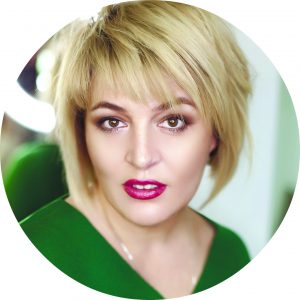The profession of a makeup artist: a course for prestige
How to raise the bar
2019-07-12

What are the main problems of the profession? How to raise the bar of prestige and avoid “hackwork” in training? About this in the article by Natalia Naida, a famous makeup artist, international class master, teacher, founder of the “Natalia Naida Author’s School of Style and Makeup.”

Our first problem is poor quality basic training, may my colleagues forgive me. The basic course, in my opinion, is the main full-fledged program, which not only gives an idea of how to perform this or that type of makeup, but also gives the future specialist the opportunity to develop “in depth.” Here is a far from complete list of academic disciplines that I would consider mandatory in this course: anatomy, coloristics, basics of academic drawing, stylistics, art history, basics of composition, imageology, basics of photography, psychology of relationships, materials science, chemistry, basics of hygiene, basics of makeup . Knowledge of these disciplines will provide the opportunity for in-depth analysis and a competent approach not only to working with clients, but also the opportunity to develop in a large number of related specialties, where the knowledge and practical skills of our masters are very much required. Our schools need not only a solid and carefully thought-out core curriculum, but also in-depth versions for narrower specializations. We need knowledge of the methods of teaching a lesson, our own textbooks, in a word, everything that is present in any serious educational institution. How can you treat a specialist if he doesn’t know who Gustav Klimt is, doesn’t understand light and shadow drawing, and doesn’t understand the textures of the products he works with? A lax attitude towards learning leads to the same attitude towards us, my dear colleagues.
I have a wonderful example - our partner school YNASTYLE (Riga, Latvia). 15 years ago, its director, Una Bernatovicha, not only changed the structure of her school, but also headed the methodological center, which today is developing unified programs and uniform requirements for the specialty and which has achieved recognition of the profession by the state. The minimum period of training for the profession is 2 years (technical school), 4 years (higher). Agree, the picture is very different from what is happening here. So a situation arises when they say about us: “She doesn’t work anywhere,” “What you are doing is not serious,” “First get a higher education, and then do whatever you want.” If it were otherwise, wouldn't you want your child to follow in your footsteps? Shouldn’t we change so that the profession goes from being just a bread profession to a prestigious one?! Colleagues, let's start small - look at our training programs, at the composition of teachers, at ourselves and begin to gradually change our attitude towards the profession, which is so important for each of us. Let's close paper academies and open full-fledged schools, let's finally do something for ourselves and our future. And one more thing... Let's not wait another year to change something, let's start today!
Read also
- Working as a makeup artist on a TV channel: where to start and what is important to know?
- Mitya Gribko about working as a makeup artist with brands: where to start?
- Pat McGrath on adolescence, black hairbands and favorite TV shows
- Top 7 makeup brushes that top makeup artists are crazy about
- Larisa Larina: “In New York you need to be able to do everything!”
- Working with problem clients: what to do and how to behave as a makeup artist?
- On Makeup Artist Day: 7 beauty revolutionaries of our time
- Educational literature for stylist
- Kevin Ecoan
- Mario Dedivanovic
- Patrick Ta
- Charlotte Tilbury
- Alina Ermakova
- Evgenia Yaroshenko-Chumakova
- Irina Chernysh